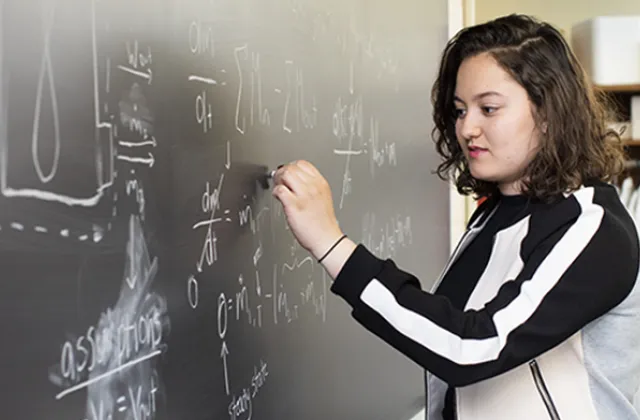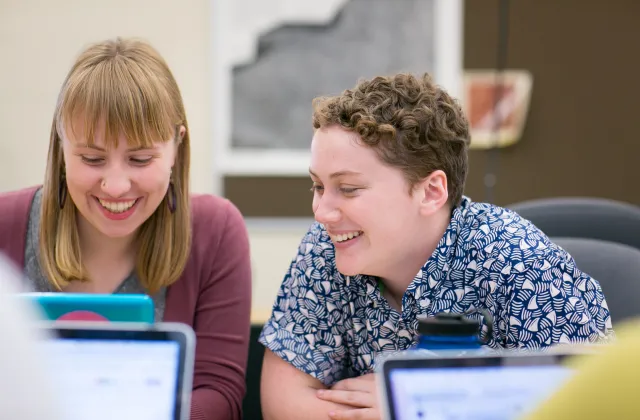Campus Community & Resources
Disabled students come to Smith College from neighboring towns, across the nation, and around the globe. Disabled students bring unique strengths, talents, creativity, and experiences that strengthen and enrich the diversity of the Smith academic and residential community.
The Accessibility Resource Center is deeply committed to fostering community and connections among students with disabilities where self-knowledge, understanding, peer support, mentoring, empowerment, and engagement around common challenges and solutions can blossom.
ARC information for instructors is now available.
Events & Meeting Access Guidelines
There are four essential requirements to address proactively. Additionally, the document includes more detailed accessibility guidelines for events which need to be considered in the planning process and incorporated to the greatest extent possible. All individually requested accommodations must be arranged for and provided, unless there is a specific reason that is not possible. Please contact the Accessibility Resource Center (arc@smith.edu) with questions.
General Accessibility Tips & Tools
The Smith College Libraries’ Open Education Resources (OER) page includes many helpful accessibility tips and tools.
Disabled Student Alliance
The Disabled Student Alliance is a student organization comprised of students with all types of disabilities that works to create community, promote visibility, and address ableism, particularly at its intersections with other social justice issues.
Peer Mentoring Program
The Peer Mentoring Program launched in 2013, in response to a history of disabled students expressing an interest in connecting with one another socially and academically.
The Peer Mentoring Program matches experienced students with disabilities to incoming students with disabilities in a mentor/mentee relationship. Mentors provide support and advice to their mentees based on their own experiences navigating Smith with a disability. Individual weekly meetings between mentor and mentee are encouraged. Please contact the office for more information or to sign up.
Email Templates for Students with ARC Letters
Dear Professor [Last Name],
[[Personalized greeting.]]
I am a student in your [insert class] class. I provided my ARC letter to you on [insert date]. As a reminder, I have [insert specific accommodation] and need to use it for our assignment due on [insert date]. I would like to talk with you about submitting the assignment on [[date that complies with your accommodation]]. Can I [[come to you office hours/however you want to communicate]] before the due date to discuss how the accommodation will be implemented? Please let me know what works for you.
Thank you!
[Student Name]
Dear Professor [Last Name],
[[Personalized greeting.]]
I am a student in your [insert class] class. I provided my ARC letter to you on [insert date]. As a reminder, I have [insert specific accommodation] and need to use it for our test on [insert date]. I would like to [[come to your office hours/however you want to communicate]] before the test to discuss how the accommodations will be implemented. Please let me know what works for you.
Thank you!
[Student Name]
Campus Resources
In addition to the accommodations provided to students with documented disabilities by the Accessibility Resource Center, students are encouraged to use the following on-campus resources.
If you think some of these options may be helpful for you, be sure to talk with your adviser(s) and class dean.
The Jacobson Center for Writing, Teaching, & Learning
The Jacobson Center, located in Seelye 307, offers a variety of services to help students develop skills in writing and effective learning. Jacobson Center staff make every effort to address the needs of students with learning disabilities. Writing counseling and peer subject tutoring are provided to all Smith students through the Jacobson Center.
Local Transportation
Please see these links for information about the city and PVTA.
Other Resources
Additional COVID-19 Support
In our COVID-19 efforts we want to clearly acknowledge there are students, staff, and faculty with immune disorders, disabilities, or other health conditions who will continue to live with greater risk for the foreseeable future.
We are committed to exploring accommodations and alternative strategies where possible and necessary, and to finding individualized solutions wherever it is reasonable and efficacious to do so, in order to safely care for all members of our community.


